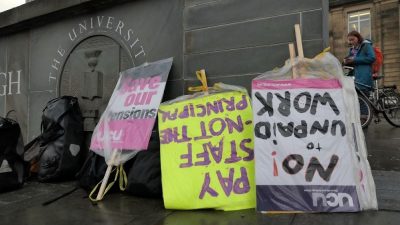To escalate or not to escalate? University and College Union (UCU) members currently out on strike are facing a dilemma. They have been on strike most years – with a brief interlude during the pandemic – pushing back against changes to higher education and the USS pension scheme. However, they have won very little. Strikes have, for the most part, consisted of a few days here or there, never fully using all their leverage.
While there have been debates inside the union about what kind of industrial action can win, in the run up to the dispute, some parts of the union were arguing to halt strike action. However, there is a growing movement of newer UCU members and early career academics calling for a radical escalation: an all out indefinite strike. What is clear is that the previous strategies haven’t borne fruit.
This year members voted in an aggregated ballot, an all or nothing punt. Instead of each institution needing to meet the 50 per cent turnout threshold, to succeed 50 per cent of all higher education members needed to turnout to vote. In previous years, the number of institutions on strike was patchy, with many not making the ballot threshold.
There is new energy bubbling to the surface on picket lines
For this strike, the turnout was 60.2 per cent on the pension dispute and 57.8 per cent on pay and conditions. This was beyond what many expected. As a result the picket lines are reinvigorated, with many reporting the largest turnout in years, and many members who haven’t been able to strike in years out picketing.
There is new energy bubbling to the surface on picket lines. Debates on tactics and strategy are back – and meaningful. There are three clear issues facing strikers. Firstly, members’ hands may be forced. There are threats at Wolverhampton and Queen Mary, as well as other institutions, that if academics don’t rearrange teaching lost on strike days they will face 100 per cent deductions in pay. At that point, there is nothing to lose by going on an all out indefinite strike.
Second, this strike is taking place in the context of other national union disputes. A resounding victory now could encourage nurses, teachers, train guards, drivers and postal workers not to settle for less. After years of real terms decline in academic pay, a win would rebuild faith in the union and also give hope to the millions who are unionised in Britain.
Finally, the feeling on the picket lines I visited this week was that escalation was needed to win. Many were talking about how an indefinite strike needed to be called. This is a long way from the mood in previous disputes. At this juncture, a few days here or there of action won’t win the battle for our higher education system.











